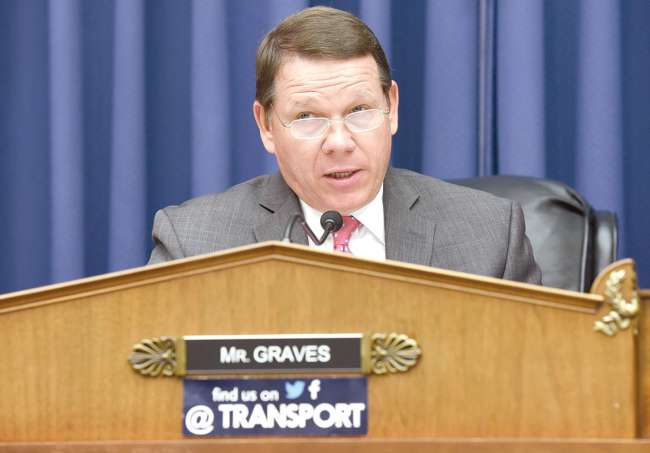Senior Reporter
Vehicle-Miles-Traveled Fee ‘Seems to Capture All Users,’ Rep. Graves Says

With policymakers debating the thorny issue of infrastructure “pay-fors,” the top highways policymaker recently touted a vehicle-miles-traveled fee as a funding approach capable of addressing the country’s needs.
Highways and Transit Subcommittee Chairman Sam Graves (R-Mo.) emphasized “political realities” are requiring lawmakers to consider adopting different funding approaches for infrastructure. The funding status quo, which includes relying on the Highway Trust Fund, “isn’t paying the bills,” he explained.
A VMT tax would charge users based on the amount of driving they do instead of the gasoline they purchase. Proponents say it would reflect motorists’ use of fuel-efficient vehicles.
“I’m open-minded to all solutions, but a vehicle-miles-traveled user fee seems to capture all users, which gets us the funding we need to fix our roads and bridges and allows us to look forward to those transformative projects that will slingshot the United States ahead of the rest of the world,” Graves said in a statement to Transport Topics on March 13.
“As a senior member of the Transportation [and Infrastructure] committee, I am amazed by all the technological advancements being made within our transportation system but the government needs to keep up. I’m optimistic that technology not only will improve how our infrastructure network functions but can also be harnessed to help solve how we fund it,” Graves said.
Speaking to reporters on March 7, the congressman indicated he would review the merits of other approaches designed to boost funding, insisting “everything’s on the table.” Raising federal fuel taxes, however, is an approach he said many of his colleagues “are philosophically opposed to” adopting.
Many say that it is politically impossible to raise the gas tax. This is a fallacy.
Ed Mortimer, transportation director, U.S. Chamber of Commerce
Oregon has led the way in testing a voluntary VMT program, which is limited to 5,000 cars and light-duty commercial vehicles. The state charges participants a 1.7-cents-per-mile tax for using public roads. Other states, such as California and Washington, are testing the VMT model. The Colorado Department of Transportation also conducted a pilot project.
“We anticipate this as a replacement for the fuel taxes that are currently the main source of funding for our roads,” Colorado transportation director Michael Lewis told Graves’ subcommittee March 7. “Vehicle miles traveled is the metric used to gauge the number of vehicles on the road and how many miles they are traveling. As the number of people in the state increases, so does the number of vehicle miles traveled and wear and tear on our roads.”
The White House Council of Economic Advisers’ annual report released last month touted Oregon’s model.
“The declining revenue productivity of existing gasoline taxes has led policymakers to consider other options for funding highways,” the report stated. “One innovative approach is to consider supplementing or replacing fuel taxes altogether with a user fee more closely related to a consumer’s use of the system, such as, in the present context, a tax on vehicle miles traveled.”
Opponents argue a VMT tax would allow the government to monitor their driving habits.
With an existing network for collecting revenue, a federal fuel tax hike remains a viable approach for quickly boosting infrastructure dollars, groups such as the American Society of Civil Engineers and the U.S. Chamber of Commerce say.
The federal Highway Trust Fund backed by revenue from fuel taxes will become insolvent by 2021. The 18.4-cents-per-gallon gas tax and 24.4-cents-per-gallon diesel tax have not been raised since 1993.
“Many say that it is politically impossible to raise the gas tax,” the chamber’s transportation director, Ed Mortimer, told lawmakers March 7. “This is a fallacy.”
House Speaker Paul Ryan (R-Wis.) said he is staunchly opposed to raising fuel taxes. President Donald Trump endorsed the hike during a private meeting with lawmakers.
Staff Reporter Eric Miller contributed to this article.



